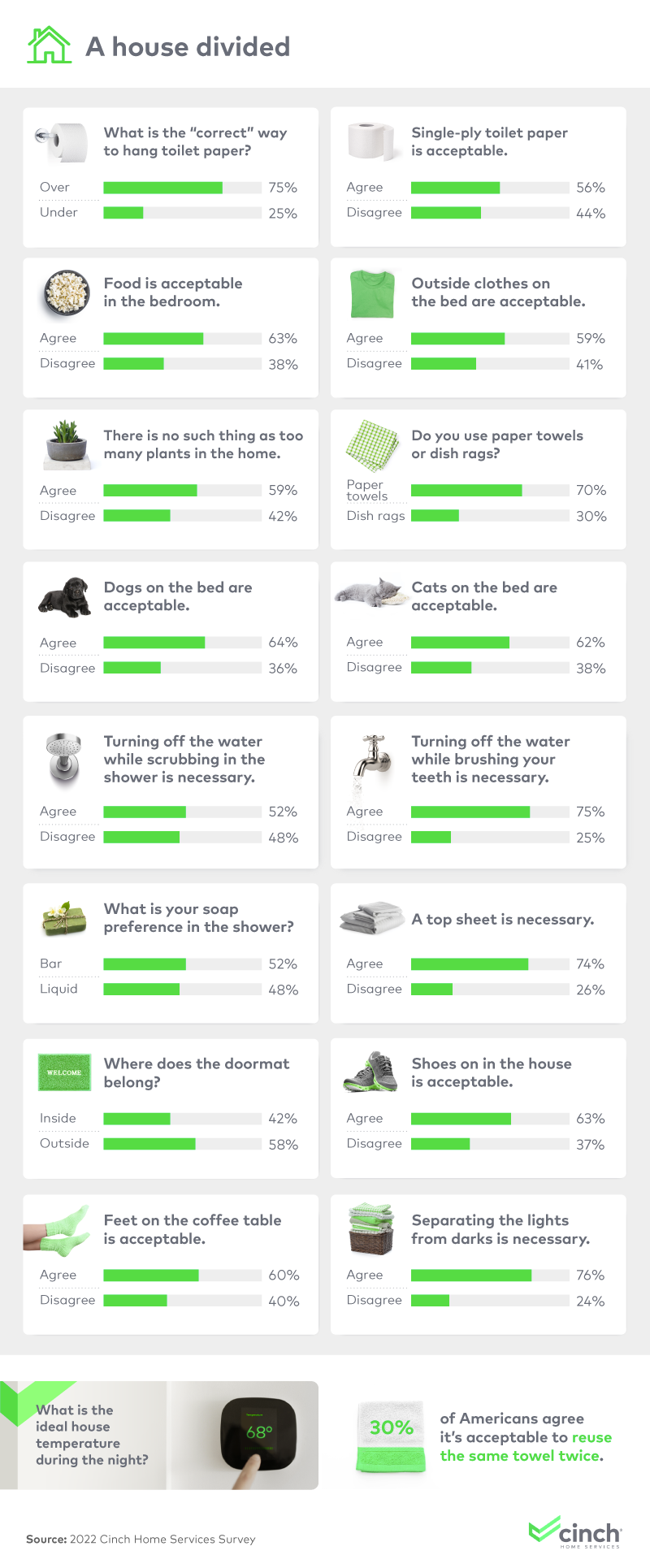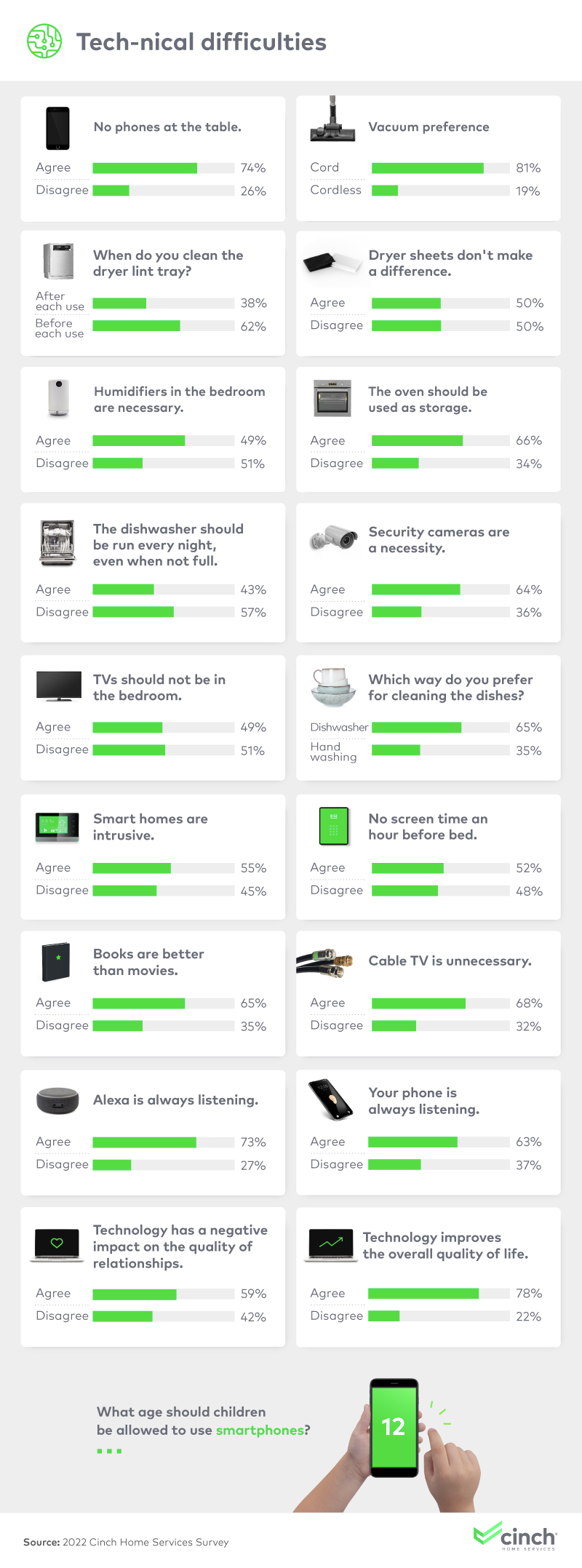Too many cooks in the kitchen? There sure can be when it comes to food preferences. With the uprising of self-proclaimed "foodies," people have an opinion about everything: Coke or Pepsi, thick or thin crust, crunchy or smooth peanut butter…the list goes on. But it goes even deeper than food – people have strong points of view about how things should be in many other aspects of their home.
We'll explore these topics and more in this study about what makes people tick, which home and lifestyle issues people agree or disagree on the most and what can drive a wedge between people sharing a space. We surveyed over 1,000 American men and women about some of the most controversial home and food debates to see how far these opinions go.
Deal-breaking decisions
Some of the most-debated topics may seem mundane, but they can be critical for a successful relationship. Let's examine which home essentials are most important to the men and women we surveyed.

When living alone, it's easy to take some decisions for granted. You have the autonomy to make your own choices without worrying about what someone else thinks. But living with others can create tension when people disagree, and according to our survey, they often do.
Debates about the home can have a serious effect on romantic relationships. The biggest deal-breaker? Not agreeing on the same temperature for the house's thermostat. We found that it's a hotly debated argument among 45% of Americans. Most people prefer to set theirs at 69 degrees during the day and 68 at night.
The second most controversial issue among people in relationships was separating laundry, a topic debated by 38% of respondents (76% were strict about separating lights and darks). Following that were preferences for reusing towels (30% felt it's acceptable to use the same one twice), having food in the bedroom (just over 60% were fine with it) and whether pets should be allowed on the bed (62-64% said it's OK).
Food fights
A lot of decision-making in the home has caused people to butt heads if they don't share the same opinion. Next, we explored the foodie world and found that opinions on food and drinks are no exception.

Most Americans will agree that ketchup is a must-have condiment. What they can't agree on is how to store it: 32% of Americans have argued over whether ketchup belongs in the refrigerator or the cabinet. The fridge won by a landslide, with 85% agreeing that this is the correct home for the iconic red condiment.
The truth is that ketchup is shelf-stable until it's open; any food product that says 'refrigeration required' on the label needs to be kept in the fridge. The ketchup debate between dating partners turned out to be the biggest obstacle for both men and women to overcome. Who knew condiments could cause so much tension in a relationship?
Food tends to generate a sense of passion for many. But is there such a thing as too much passion for food and how we eat it? Over one-quarter of Americans have debated about pizza, either about pineapple as a topping or whether or not it's best to eat it folded. We found an almost even split on both issues: 57% enjoy pineapple on pizza and 43% don't, while 52% fold their pizza and 48% don't.
What's more, pizza preferences have the potential to create relationship tension. Folding pizza made the list of top five deal-breakers for 9% of women and 10% of men, while 9% of men and 11% of women felt the same about pineapple on pizza. The food debates don't stop there: 29% percent have argued over peanut butter, with 71% preferring creamy. Peanut butter preference was a top issue for men when it comes to dating, but it wasn't nearly as important to women.
Then there's the age-old Coke versus Pepsi debacle, with Coke being the clear winner at 74%. Depending on where you live in the country, some people even use the term "coke" as a general reference to soda, which speaks loudly of the brand's popularity. But let's move away from these classic debates and into the new age of the digital world.
Technological etiquette
Many of the most common debates we discovered are very different from the ones we might have found 50 years ago. Smartphones, "screen time" and other entertainment sources are intense topics these days, especially when raising children. Let's explore how modern technology affects families and relationships.

The biggest home tech debates are about smartphones. Over a third of Americans have discussed whether or not phones should be allowed at the kitchen table, and nearly three-quarters agreed they absolutely should not be. They're right; according to a clinical child psychologist, the habit of having phones at the table can hinder kids' development and prevent families from connecting in meaningful ways.
The appropriate age for a kid to have a smartphone was an argument had by a quarter of Americans. Most agreed they should be no younger than 12 years old, and 15% of men even felt that this decision was a dating deal-breaker. Another relationship complication could have even graver consequences: whether or not to use the oven for storage. A quarter of Americans have argued about this, with 66% saying it's OK to do.
A top relationship problem for women was when to clean the dryer lint tray. Most people felt that you should clean it out before using the dryer (62%), while the rest preferred to do it afterward. A quarter of Americans have also debated whether to wash dishes in the dishwasher or by hand, and 65% agree: The dishwasher is the way to go! Sometimes technology wins, after all.
Everyone has an opinion
Controversy within the home comes in all forms. People have some strong opinions about certain household and food preferences, so much so that their opinions could result in a breakup. You might not be able to control what temperature someone likes to keep the house at or whether they think ketchup goes in the fridge or the cabinet, but you can try to keep a cool temper while you talk it out!
Methodology
We surveyed 1,005 Americans regarding household debates. The mean age of respondents was 41 years old. Among them, 52% were male, and 48% were female. Respondents comprised the following generational breakdown: 23% Gen Z, 28% millennials, 26% Gen X and 23% baby boomers. To help ensure that all respondents took our survey seriously, they were required to identify and correctly answer an attention-check question. Survey data has certain limitations related to self-reporting. These limitations include telescoping, exaggeration and selective memory.
About Cinch Home Services
Cinch Home Services wants to make homeowners feel safe in their space. They make home protection easy with home warranties and protection plans that are simple and affordable.
Fair use statement
Although there are many things we can debate about, sharing content with the right attribution is not one of them. We would love for you to share these findings with your friends, but please be sure to link back to this page when you do.
